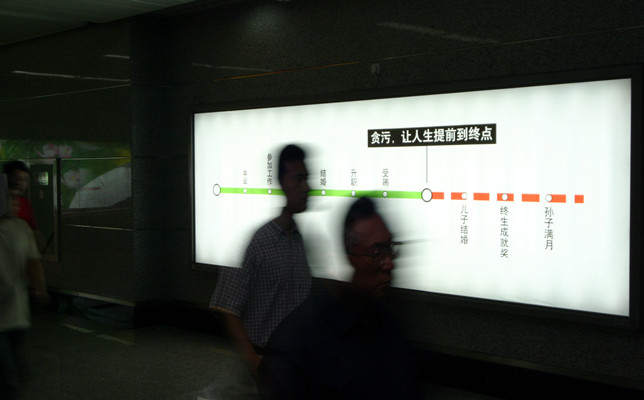Anti-graft efforts go for standardization
(chinadaily.com.cn) Updated: 2014-09-25 19:20
 |
|
An ad reading "corruption sends life to an early end" is on display in a subway station, Beijing, Aug 26, 2003.[Photo by Xu An/Asianewsphoto] |
For years, China has streamlined the assembly line as the world's factory, now the country's capital is seeking to standardize its anti-corruption efforts with the installation of "conversation rooms".
The Beijing Municipal Commission for Discipline Inspection announced that it will install at least three "conversation rooms" to standardize corruption interrogation across it's facilities in the city, Beijing News reported.
According to the Beijing News, the 10-square-meter rooms are all white except the floor. When talking with subjects, investigators can communicate with the directors next door in "command rooms" through computers without "disrupting the pace of the interrogation".
The tables, chairs and walls inside are upholstered to prevent officials from injuring themselves during the questioning. The rooms are said to provide a serious atmosphere and increase the efficiency for investigations.
Before the installation of the rooms, investigators had to meet their subjects in empty meeting rooms or offices.
China has witnessed a growing number of suicide cases among government officials since 2013, when Chinese president Xi Jinping vowed to crack down on both "tigers" and "flies", terms for corrupt high and low ranking officials. President Xi's anti-corruption drive targets officials of all ranks.
The orders for the rooms come as the capital launched a new "general offensive" towards corruption at all levels.
In Beijing, the number of investigations into official corruption citywide has reached 772 over the first eight months of 2014, an increase of 64 percent over the same period in 2013, the report said. In a recent case, an accountant in a county level government was found embezzling 119 million yuan($19.4 million) of public funds.
According to an investigator, most of the clues to misbehavior come from public tip-offs. The authorities are also paying more attention to lighter offenses hoping that it would prevent them from snowballing to major cases.
The anti-graft actions should not be a temporary "campaign", Zhu Lijia, an expert with Chinese Academy of Governance, said. "It should be normalized by establishing institutions and rules".
- Govt encourages people to work 4.5 days a week
- Action to be taken as HIV cases among students rise
- Debate grows over reproductive rights
- Country's first bishop ordained in 3 years
- China builds Tibetan Buddhism academy in Chengdu
- Authorities require reporting of HIV infections at schools
- Typhoon Soudelor kills 14 in East China
- Police crack down on overseas gambling site
- Debate over death penalty for child traffickers goes on
- Beijing to tighten mail security for war anniversary







